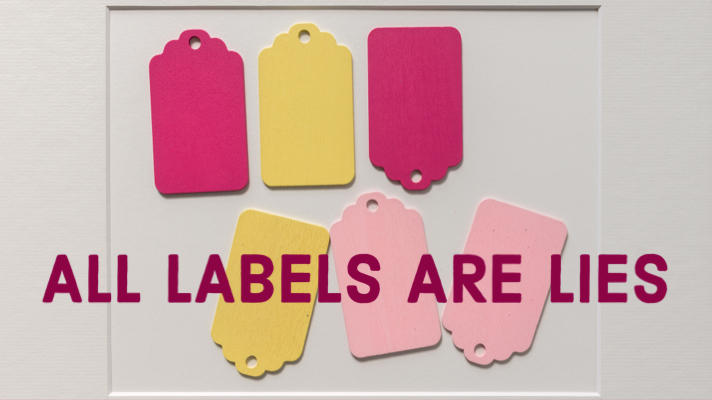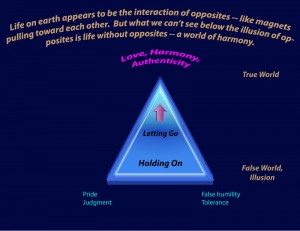Victimhood and Victories
Labels create invisible prisons. Sometimes the cell walls are imposed by others (discussed in Part I). But often, people hold on to labels even though they’re destroying or imprisoning themselves.
Individuals and cultures hold on to victories and victimhood affecting their perspectives. We’re all victims of the illusion — perpetrators and victims are just roles relabeled victor upon winning and victim upon losing. Both hold on to their labels; therefore, history repeats itself. Battles on all levels are simply the meeting of opposing beliefs. The one who is least emotional will win. The True Self can’t lose because at that state of mind, we have no beliefs or emotions.
The victorious hold on to their superior label because they perceive it gives them power. Too often, the perks of victimhood are just too delicious. The victim often becomes the perpetrator when they won’t let go because they perpetually punish the victor in their mind.
Heroism
True heroism is beyond labels. Fighting a war or doing what most believe impossible is heroism in the illusion. In truth, letting go takes far more courage and compassion, but you’ll never be labeled a hero for letting go. A hero requires an enemy. There are no enemies outside the illusion. Batman isn’t needed without the Joker.
The illusion rewards and disempowers us at the same time. We applaud someone who says: “I’m a recovering drug addict.” At the same time, they’re told they’ll fight that battle for life. Habits exist because the cause persists. We didn’t create the cause; we simply believed the illusion just like everyone else.
Positive labels, like hero or survivor, feel good until we realize that good labels are false and have no lasting power to protect us. Positive emotions keep us trapped just like those we label negative. We love rags-to-riches and hero stories. But to maintain the hero label, we must keep the poverty or opposition in our mind as a potential. One day the opponent or problem we thought we defeated could gain enough strength to return. Letting go provides the safety that we think we can only get from heroism and winning.
Pride
Pride creates seductive labels that are often hard to let go. A good example is the American bumper stickers that say, “My kid’s an honor student.” Parents love them; most kids hate them. Next grading period the kid doesn’t make honor roll. Now they have to look at that fucking bumper sticker everyday and remember how they were special because of something they did, not who they are.
Titles are another form of label. Doctor, General, Queen, or Pope are professions, but people use the titles to define superiority and inferiority based on knowledge, position, or pedigree. The titles don’t belong outside the office. We aren’t our jobs.
One who fears pride tends to avoid saying anything good about themselves. They develop false humility that keeps them artificially small. There’s nothing wrong with saying, “I got the Nobel Peace Prize.” Everyone will be happy for us unless they have jealousy issues. But if years later, we introduce ourself by saying, “I’m John, Nobel prize winner,” at a cocktail party where it’s out of context, then pride has come to stay. Pride causes us to hold on to labels instead of letting them go and discovering who we really are. When we make our career, college, team, nationality, or children’s accomplishments matter more than who we are, we’re screwed.
Judgments
Judgments are permanent labels. Judging another creates false superiority by placing us in the masculine role. But superiority is illusory. The judge is just as locked in the illusion as the person they’re judging. The pair now have an unhealthy false-self connection. Judges are certain they’re right; some hold the other on the hook forever. They choose false-self rightness over being their True Self. The True Self views opposition as false and powerless. There’s no need to punish or forgive; letting go is all that’s necessary.
It’s never too late to let go of judgment. People have freed me of judgments without saying a word. I could feel it. When we hold another on the hook, we hold ourselves on the hook. When another won’t free us, we feel that they’re in our mind or body. The emotions feel endless.
Those emotions will leave if we recognize the judgement against us was false. But we won’t do that if we fear the judge might be right. We might need the judge. Or we maybe we think our emotional connection with the judge is love.
Someone who constantly labels us with, “You are…” doesn’t love us. Judging isn’t love. We’re simply a good projection screen for them so they don’t have to own, fix, or suffer the consequences of their beliefs. We’re an enabler if we allow them to continue to project on us.
When we let go of our feminine role in their life, we see that. This took me so long to learn this lesson. If the judge wants the truth, they’ll hear us. If not, we’ll join the ecstatically joyous divorcees’ community. We’ll realize we’d rather be happy and homeless than spend another day working for an authoritarian ass. We’ll leave our religion for a breath of fresh air. When we escape our handlers, we catch a whiff of the heaven on earth that the handler promised but never delivered.
“The false masculine role always tells us that we’re doing to them what they’re actually doing to us.” Most people are on the receiving end of that giant illusory error because they’re stuck in false feminine roles. The false masculine role has become far too proficient at the projection of labels. Don’t wait for them to change. Step out of the role as their mirror by letting go. When there’s no one left to project on, the game will end.

